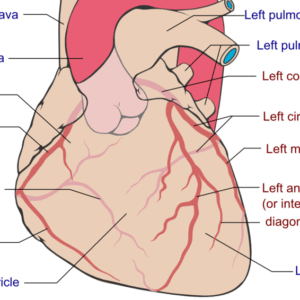Cardiology > Hypertensive Heart Disease
Hypertensive Heart Disease
Background
Hypertensive heart disease (HHD) refers to a spectrum of structural and functional cardiac abnormalities caused by prolonged, uncontrolled hypertension. It includes left ventricular hypertrophy (LVH), heart failure with preserved or reduced ejection fraction (HFpEF or HFrEF), ischemic heart disease, and arrhythmias such as atrial fibrillation.
II) Classification/Types
By Manifestation:
- Left Ventricular Hypertrophy (LVH)
- Diastolic Dysfunction and HFpEF
- Systolic Dysfunction and HFrEF
- Ischemic Heart Disease
- Arrhythmias (especially atrial fibrillation)
By Stage (ACC/AHA Heart Failure Classification):
- Stage A: At risk for heart failure (e.g., hypertension, diabetes)
- Stage B: Structural heart disease (e.g., LVH) without symptoms
- Stage C: Structural disease with prior/current symptoms of heart failure
- Stage D: Refractory heart failure requiring specialized interventions
III) Pathophysiology
Chronic elevation of systemic blood pressure leads to increased afterload, causing the left ventricle to hypertrophy to maintain cardiac output. Over time, this results in impaired diastolic filling, increased myocardial oxygen demand, interstitial fibrosis, and eventual systolic dysfunction. LVH also predisposes to arrhythmias and ischemia.
IV) Epidemiology
- Highly prevalent among hypertensive patients—affects ~20–30% of adults with chronic hypertension
- Increased risk in African American populations
- Strongly associated with poor BP control and long-standing hypertension
- Major contributor to cardiovascular morbidity and mortality worldwide
Etiology
I) Causes
- Long-standing, poorly controlled hypertension
- Secondary hypertension (e.g., renal disease, primary aldosteronism)
- Coexisting atherosclerotic disease
- Genetic predisposition to hypertrophy or heart failure
II) Risk Factors
- Hypertension (primary risk factor)
- Advanced age
- Male sex
- Obesity
- Diabetes mellitus
- Chronic kidney disease
- Smoking and dyslipidemia
Clinical Presentation
I) History (Symptoms)
- Early stages may be asymptomatic
- Dyspnea on exertion or orthopnea (HF)
- Fatigue, decreased exercise tolerance
- Palpitations (atrial fibrillation)
- Chest pain (hypertrophy-induced ischemia)
- Nocturnal cough or paroxysmal nocturnal dyspnea
II) Physical Exam (Signs)
- Elevated blood pressure
- Displaced, sustained apical impulse (LVH)
- S4 heart sound (diastolic dysfunction)
- S3 heart sound, rales, elevated JVP, peripheral edema (heart failure)
- Irregularly irregular rhythm (atrial fibrillation)
Differential Diagnosis (DDx)
- Coronary artery disease (CAD)
- Primary cardiomyopathies (e.g., hypertrophic, dilated)
- Valvular heart disease
- Infiltrative cardiomyopathy (e.g., amyloidosis)
- Constrictive pericarditis
- Pulmonary hypertension/Cor pulmonale
Diagnostic Tests
Initial Work-Up
- Blood pressure measurement (confirm chronicity)
- ECG: LVH, atrial enlargement, arrhythmias
- Chest X-ray: Cardiomegaly, pulmonary congestion
- Echocardiogram: Gold standard for assessing LVH, EF, wall motion
- BNP/NT-proBNP: Heart failure biomarker
- Cardiac MRI: Advanced imaging of myocardial structure and fibrosis
- Stress testing: If ischemia suspected
- Labs: CMP, CBC, TSH, lipid profile, HbA1c
Treatment
I) Initial Approach
- Optimize blood pressure control (goal: <130/80 mm Hg)
- Assess for heart failure and ischemia
- Address modifiable risk factors: smoking, diet, exercise
- Evaluate and treat underlying causes
II) Medications
Drug Class | Example | Notes |
ACE inhibitors | Lisinopril, Enalapril | Reduce afterload, LV remodeling |
ARBs | Losartan, Valsartan | Alternative to ACEi |
Beta-blockers | Metoprolol, Carvedilol | Rate control, reduce myocardial oxygen demand |
Diuretics | Furosemide, HCTZ | Symptomatic relief in volume overload |
Aldosterone antagonists | Spironolactone | HF with reduced EF |
CCBs | Amlodipine, Diltiazem | May help with BP and angina |
III) Devices & Advanced Therapies
- ICD or CRT in advanced heart failure with reduced EF
- Ablation for refractory atrial fibrillation
- Cardiac transplant (end-stage)
Patient Education, Screening, Vaccines
Education
- Adherence to antihypertensives and lifestyle changes
- Low-sodium, heart-healthy diet
- Regular exercise, smoking cessation
- Recognizing symptoms of heart failure
Screening
- Annual BP measurement
- Echocardiography for LVH if high risk
- Screen for associated conditions: diabetes, dyslipidemia
Vaccinations
- Influenza, pneumococcal, and COVID-19 vaccines
- Especially important in HF or CKD
Consults/Referrals
- Cardiology: Confirmed HHD, symptomatic heart failure, or arrhythmias
- Electrophysiology: Recurrent atrial fibrillation or need for pacing
- Nephrology: CKD or resistant hypertension
- Nutritionist: Dietary counseling
- Physical therapy/cardiac rehab for deconditioning
Follow-Up
Short-Term
- Monitor BP, volume status, symptom control
- Adjust medications based on BP and EF
Long-Term
- Lifelong management of hypertension
- Periodic imaging (e.g., echocardiogram)
- Monitor for complications: AF, HF, ischemia
- Address psychosocial factors and adherence
Prognosis
- Favorable with early diagnosis and tight BP control
- Poor outcomes associated with persistent LVH, HF, or arrhythmias
- Major cause of cardiovascular morbidity and mortality if untreated
Stay on top of medicine. Get connected. Crush the boards.
HMD is a beacon of medical education, committed to forging a global network of physicians, medical students, and allied healthcare professionals.

